 These days all hotels worthy of the name “hotel”, and most hotels that aren’t, have a network connection and a computer program that allows them to register all guests at the hotel with the provincial Public Security Bureau. For all intents and purposes the system is standardized. I’ve found some small differences from province to province but having seen it in action in Beijing, Hebei, Shanxi, Shaanxi, Gansu, Sichuan, Chongqing, and Guizhou, I think it’s safe to say that it’s standardized and nationwide.
These days all hotels worthy of the name “hotel”, and most hotels that aren’t, have a network connection and a computer program that allows them to register all guests at the hotel with the provincial Public Security Bureau. For all intents and purposes the system is standardized. I’ve found some small differences from province to province but having seen it in action in Beijing, Hebei, Shanxi, Shaanxi, Gansu, Sichuan, Chongqing, and Guizhou, I think it’s safe to say that it’s standardized and nationwide.

For us foreigners, the current system really isn’t all that different from the old style paper form that we were supposed to fill out (but often didn’t) when we checked into a nice place. In terms of rules and regulations, the system probably isn’t all that different for Chinese. Of course, in terms of actually requiring people to follow the rules, it’s probably just as new and different for them as it is for us.
I wasn’t paying careful attention when the requirement for licenses was revoked. When I arrived in China in 2002 I was told by my waiban that I could only stay at International Youth Hostels and hotels that were rated four star and above. I think the change was discussed in Spring of 2003 and I’m certain it went into effect by the October Holiday of 2003. My school was a big danwei and my waiban was really good at his job. Shortly before the holidays, I was taken to his office and told via translator that the rules had changed and I was now allowed to stay anywhere I wanted. “You can even stay at a private residence if you want.”
Two months after that, when the school took me to Beijing for my flight back to the US, they tried to check our party into a three star government hotel run especially for people coming from Shijiazhuang. My Chinese wasn’t good but it was good enough to understand that the waiban was making calls to various officials back in Shijiazhuang to complain that the Shijiazhuang Hotel wouldn’t accept foreigners. We stayed somewhere else that evening but before we left that hotel for another one my waiban got the names of every single person on duty.
He wasn’t just an ordinary citizen kind of trouble maker. He was the person in charge of foreign employees and foreign guests for a top class high school that had a lot of foreign guests. Still is. He made the arrangements for the people who came to test the students who were applying for a year abroad in Singapore. He was not only responsible for passports and visas for all the teachers and officials that went on the trip to Australia with the students who were studying there, he was also responsible for the Australians when they came to China. It was and still is his job to know the rules and regulations regarding foreigners but unlike most of the waibans I’ve heard about, he actually did his job. I’ve seen him twice since I left Shijiazhuang. As a Chinese speaker, I know him a lot better than I ever did when he was responsible for me. So I know that if he went to the trouble to get the names of every single manager that refused to check me into that hotel that something was done about it.
That was nearly 9 years ago and hotels are still refusing to accept foreigners because “we don’t have a license”. I’ve spent a great deal of time and effort trying to find out information about this license. The end result of all that research has been a great big zero. There are no pictures online of the license. There are no forms to be downloaded to apply for the license. No one I’ve spoken to has ever seen the license. All that exists is a firm certainty that the license must exist.
Because of the certainty that this license exists, on this year’s massive bike trip of I’ve ended up having to deal with the police on seven separate occasions. (Eight if you count the time I couchsurfed in a PSB officer’s spare bedroom.)
On one of these occasions I was told flat out “that license hasn’t existed for years.” In two different provinces the police have contacted the Provincial Foreign Affairs Bureau for assistance, been informed that the license does not exist, and managed to register me without any problem. In Chongqing’s Jiangjin County, it appears that the police are the ones who have been making a point of telling hotels that they need a license to accept foreigners but they also asked the staff of the hotel where I had issues “who said you needed a license?” The night before my last night in Guizhou Province, the police were not only unable to provide anything in writing regarding a set of required standards for a hotel, they also didn’t want me to take down badge numbers or names and report to their supervisors that they were enforcing these nonexistent standards  while both times that I dealt with the police in Guangxi Province, they were palpably relieved that I already knew what to do and, on one of these occasions, watched me use the registration system so that they could learn how!
while both times that I dealt with the police in Guangxi Province, they were palpably relieved that I already knew what to do and, on one of these occasions, watched me use the registration system so that they could learn how!
The only place I’ve been where anyone official remained adamant that a license was required to accept foreigners for overnight residence was Zanhuang County in Hebei. On this occasion, the police flat out refused to contact the Provincial Foreign Affairs Bureau. It went on for quite a while. I eventually got to go back to my hotel but, despite offering to provide them with my own copies of all the necessary paperwork to register a foreigner when not using the standardized nationwide system for registering hotel guests, they refused to even attempt to register me. Unfortunately for them, I got badge numbers and I will be filing a complaint with their provincial supervisors when I get back to Haikou. I may not have the same kind of clout my waiban from 2002/2003 has but one thing you can be certain that provincial supervisors of any kind hate is a written letter of complaint from a foreigner.

And here’s where this tutorial comes in.
I apologize for the quality of the screen shots. If the program were on my own computer, I’d have a screenshot. Instead these are photos of the screen.
First you have to get yourself behind the counter. Assume that the hotel has already said “but we don’t have the license to accept foreigners”. The correct answer to this is not to get nasty and yell “what fucking license?” Instead you need to look stunned. Speechless. Eventually stutter out something like “but I thought the Two Parties Congress of 2003 revoked that requirement”. I’m not entirely sure it was the Two Parties Congress so feel free to use whatever other impressive government words you can come up with. While they are still reeling from the fact that you, a foreigner, can throw words around like “Two Parties Congress”, ask nicely “Do you have the standardized nationwide computer system for registering hotel guests?”
Since you are probably dealing with a chain hotel, the answer will be “yes”. In 2012, I’ve managed to find places that don’t have the standardized nationwide computer system for registering hotel guests.
It took effort.
You can go for a “can I see it?” but I also find that slyly suggesting that, as the Public Security Bureau monitors (albeit not especially actively) all guests registered on the system a “how about we try using that?” and inviting yourself behind the counter to “help out” because “the system’s a little different for foreigners” works best.
It’s going to take practice to get to the point where you can reliably get yourself behind the counter of most hotels despite a firm certainty on the part of the front desk staff and manager that you are not allowed to register at their hotel. Sometimes I think they let me behind the counter because they want to see me fail. Other times they are honestly clueless and are perfectly happy to let me take over.

Point it out. “See, right here. Foreign Tourist Residency Registration.” “境外游客入佔 Surely the PSB wouldn’t have given you a computer program that lets you register foreign guests if you weren’t allowed to…” Look apologetic “It’s not your fault. I guess whoever told you about the license was misinformed.” I cannot stress how important it is to always always always give the other party the opportunity to save face.
Everything that is marked in red or starred or underlined (depending on the province) must be filled out. Having accidentally misspelled my own name on one very tired occasion, deliberately entered my passport number wrong on another, and learned after two months that I’ve been putting in the wrong visa information, I know that the computer system has issues. Once (and only once) in Sichuan, the moment I entered my passport number, almost all of the other information that had been entered the night before was automagically filled in. But it only happened the one time in Sichuan and not any of the other times in Sichuan or anywhere else so I’m not sure what was going on.
Not every province has the same things marked in red. Passport Number, Passport Type, Country of Origin, Gender, Birthdate, Type of Visa, Expected Date of Departure from China, Date of Entry into China, and Port of Entry are all reliably in red. Room number is never in red but if you don’t fill it out the system gets angry with you.
I fill out most nearly everything on the form. It’s easier than figuring out what’s in red for this province. The only blank I absolutely will not fill in is “credit card number”.
å…¥ä½æˆ¿å·: Room Number
You’ll notice that this isn’t in red but there’s a great big exclamation point next to it. You have to fill it in even though it isn’t in red. Just ask the staff what your room number is.
å…¥ä½æ—¶é—´: Time of Registration
The computer usually fills this in automatically.
国ç±/地区: Country or Region
In China, Taiwan and Hong Kong citizens aren’t Chinese but they aren’t residents of other countries either. They are residents of another region. I had this drilled into me one year at the Tour of Hainan when the Taiwanese National Team was attending. In unofficial documents in English they could be called the National Team. Official or unofficial they could not be called a National Team in Chinese. Taiwan was always always always a region. The official Chinese for Taiwan is ä¸åŽå°åŒ— “Chinese Taibei”.
Of course, since the system is supposed to be used by native speakers of Chinese who probably don’t speak any English and who are struggling to find things in your passport, it makes perfect sense that the list of countries is in alphabetical order by International Olympic Committee country code. It’s blindingly obvious to anyone who spends any time at all thinking about these sorts of weighty matters that the first and second options for overseas tourists planning on spending the night in a hotel in China should be “Aruba” and “Afghanistan” rather than the “United States” and “Japan”.
Even in Guangxi Province where the alphabetical shortcuts aren’t listed they still work so you’ll want to memorize your shortcuts. For the US you can type “USA” or “MG”. Even just a “U” will narrow down the list of options considerably.
英文姓/英文å: English Family Name / English Given Name(s)
English family name and given name(s) also are not in red in this screenshot from Guizhou but as I’ve never failed to fill them in, I don’t know what happens if you don’t. I do know that the system has very specific ideas of what is and is not acceptable and that it varies province to province. In Sichuan you cannot have two capital letters in your English family name, in Guangxi you must use ALL CAPITALS for the English name.
è¯ä»¶ä¹‹ç±»: Type of ID
On the screenshot provided, “ordinary passport” [普通护照 – pthz] is the fifth option. You can skip to it by typing “13” or “pthz”. If you just type “hz” you’ll only see the items that have an “hz” in them. You’d think it would be the most common kind of identity document being used by non-Chinese citizens and, as a result, it would be first on the list. Sometimes it’s not even in the first ten. In this case, the first item is #6 “single use entry for Taiwanese citizen” [一次性å°èƒžè¯ – ycxtbz] and the second item (clearly very relevant for a foreign national) is #10 “Chinese ID Card” [èº«ä»½è¯ – sfz].
I do not know what happened to numbers 1-5 or 7-9. At least in this particular province (Guizhou) they apparently weren’t relevant.
è¯ä»¶å·ç : ID number
The number on your ID. Natch.
性别: Gender
Later on, I will point out a place in one of the screenshots where the short code isn’t the same as the pinyin for the item. I really wish that this meant that there was some other item in that list that had the short code with the correctly corresponding pinyin. However, both “male” [ç”· – n], and “female” [女 – n] have the same short code in this drop down list. At least in Guizhou, “m” and “f” do not work as short codes. In Guangxi, they’ve given some thought to hotel staff’s inability to tell stuff about foreigners just by looking at them and options for gender include “don’t know”.
(If you need to use a short code for a two item drop down list, however, you need more help than this tutorial could possibly give you.)
出生日期: Birthdate
Obvious, I should think.
ç¾è¯(注)ç§ç±»: Type of Visa
This is probably going to be “tourism” [旅游 -ly], “study” [å¦ä¹ – xx], “business” [ç”Ÿæ„ – sy], “employment” [就业 – jy], or “employment”[èŒä¸š – zy] for most of you. About twenty options are given. In at least one province “foreigner employment visa or Taiwanese residence card” were listed together as the SAME option. If you have one of the above listed kinds of visas, the short codes I’ve given above should be sufficient for finding your visa in the list.
I only recently noticed that my employment visa is a 就业 rather than a èŒä¸š but, despite months of telling the system that it was a èŒä¸š my form has never been rejected.
ç¾è¯(注)å·ç : Visa Number
This isn’t in red in this particular screenshot but I think it’s been in red in one or more provinces. I always fill everything in as a matter of course because it’s easier than figuring out what this province wants that that province didn’t want. You’ll find this number in the upper right hand corner of your visa. When I accidentally on purpose typed it in wrong in one province, nothing untoward happened and my form was still saved.
在åŽåœç•™è‡³:Departure Date from China
Despite the fact that most of us who are here on legal visas have no problem whatsoever renewing our visa without leaving the country, the date that you will be leaving China is the date that your current visa expires. Once again, since I already have experience with other computer systems from when I did my company and visa paperwork all on my own, I already knew this and have not tried anything silly like putting in 2020.
ç¾å‘机关: Issuing Authority for Visa
The list is long. Sometimes the list is really long. Depending on my mood, I will occasionally search out and find Haikou, Hainan. Other times I’ve just put in Hainan. For all the many different ways that I’ve had the computer complain about me not filling in an entry correctly, this hasn’t been one of them.
Since all the items on this list are in China, I have no idea what a person on a tourist visa would do. My last tourist visa, oh so many years ago, was issued by the embassy in Washington DC. My parents’ tourist visa from their visit just a couple months ago also had åŽç››é¡¿ written on it as the issuing authority.
入境日期: Date of Entry
Your date of entry is NOT the date that you entered China. It’s the date of your last entry into China. For me, despite living in China since September 2002, that means my date of entry is currently July 24th, 2011. That’s when I got back from a three day business trip to Thailand. I can’t speak for certain with this computer program, but other computer programs I have dealt with that want your date of entry get very unhappy with you if you try to put your actual date of entry.
The correct format for the above date is 20110724. If you use periods, dashes, commas, or any punctuation of any kind Murphy’s Law suggests that it will be the wrong kind. To date, I’ve yet to encounter a computer that has a problem with me just putting the numbers in.

入境å£å²¸: Port of Entry
I don’t know why they care about your port of entry but they do. Some of the provinces list “Beijing,” “Shanghai”, and “Guangzhou” at the top of the list. Most of them just start with something totally random and continue from there in what appears to be a quasi-geographical type of ordering done by someone who may have been throwing darts at a map.
If you take a careful look at the above screenshot, you’ll also notice that the short letter code for Qinghuangdao West Port 西港(秦皇岛) instead of being the first letter of each character’s pinyin XGQHD is XDQHD. So if the place where you entered has a long name like 广州白云国际机场/Guangzhou Baiyun International Airport, you will not want to look under GZBYGJJC (that’s the first letter of the pinyin for each character) because there is a distinct possibility that the person who programmed in the full name isn’t as good at pinyin as you are and/or failed to notice a typo.

If, like me, Guangzhou was your most recent port of entry, just using “by” for 白云 will narrow the list down sufficiently that you can find it without reading through every single place that foreigners can conceivably enter into China.
è¯ä»¶æœ‰æ•ˆæœŸ: ID Expiration Date
I don’t think I should need to explain this one. As you will see in the screenshot, the numbers are separated by dashes. Some provinces want dashes. Some want periods. Just put in all the numbers at once 20190820 and the computer will put the right punctuation in.
接待å•ä½/接待人: Host Organization/ Host Person
Some of the hotels I’ve stayed at that have actually seen a foreigner before have put in their own hotel name in that blank. Some haven’t. I usually put my company name. The system has not complained either way.
In the screenshot, the blank for host person is still my English name. The computer ended up not accepting that. Despite the fact that I used the same Chinese name for “Name in Chinese”, the computer had no problem on that occasion (or any other occasion) with it being the same.
从何地æ¥/到何地去: Coming From/Going To
For this trip I’ve been choosing “Beijing” for coming from and “Haikou” for going to ever since the computer didn’t like me choosing the last city I’d stayed in. It knew that I hadn’t registered in the last city I’d stayed in. This list is enormous and is usually but not always ordered semi-geographically.

I am particularly amused to note, as you will see in the screenshot to your left, that one of the places I can choose for Hainan is 通什市. When I arrived in Hainan in 2004, 通什市 had already been renamed 五指山市.
åœç•™äº‹ç”±: Reason for Visiting
This option is reliably hidden. It isn’t always a required item but it often is. If it turns out to be one of the ones you were supposed to fill in and you miss it, when you press “save” the computer will let you know you didn’t fill it in. Otherwise, you can look for the scroll bar in the middle of the screen.
 Once again, the options are not in any particularly useful order. As you can see in the screenshot to your right, they are listed in numerical order by codes “15,” “12,” “13,” “14,” “99,” “01” corresponding to “Interview” [采访 – cy], “Wedding” [婚礼 – hl], “Purchasing Property” [è´æˆ¿ – gf], “Doctors’ Visit” [就医 – jy], “Other” [其他 – qt], and “Study” [å¦ä¹ – xx]. There are about 50 options.
Once again, the options are not in any particularly useful order. As you can see in the screenshot to your right, they are listed in numerical order by codes “15,” “12,” “13,” “14,” “99,” “01” corresponding to “Interview” [采访 – cy], “Wedding” [婚礼 – hl], “Purchasing Property” [è´æˆ¿ – gf], “Doctors’ Visit” [就医 – jy], “Other” [其他 – qt], and “Study” [å¦ä¹ – xx]. There are about 50 options.
I’ve yet to see anything other than 采访/interview first and 婚礼/wedding second. As you are probably not a journalist (or, if you are a journalist aren’t traveling on official business that had you notifying the local government in advance) whatever you do DO NOT PICK 采访. I don’t know what will happen if you do pick it but I know for certain that local governments get fussy about foreign journalists. Go with “travel and tourism” 旅游 (ly). It’s probably the truth.
èŒä¸š: Profession
Also reliably hidden. You’ll notice that in this screen shot it is not a required option. However, it is often a required option. If you can find the Reason for Visiting blank, you can find this one.
You will be presented with a totally random list of unordered options and none of them will fit very well. I always pick ä¼ä¸šç»ç† (qyjl) because, as the manager of a translation agency, it’s a better fit than soldier or student.
Once you press save you’ll be asked whether or not you want to print off a copy of the Temporary Residence Registration Form for Foreigners. It’s a trick question. Don’t do it! Most of the hotels don’t have a printer connected. So, if you click “yes” you’ll get an error message. Click “cancel” instead.
I’ve only tried to stay in a hotel room with a Chinese person once where the system got used. Despite the room having two beds, my being registered to the room effectively canceled out his registration. I don’t know what the hotel ended up doing after that. For all I know they did nothing. We went out to dinner.
Avoid having your passport scanned. In theory the system has text recognition and will automagically fill in most of the blanks from seeing your passport. In reality, it will cough and hiccup and fail more often than not. Also, many hotels have a mini-scanner that’s just the right size for an äºŒä»£èº«ä»½è¯ or a Chinese driver’s license but which cannot cope with a passport.

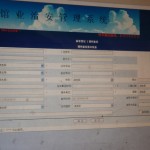
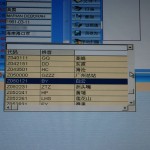
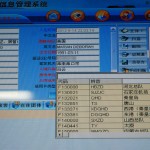
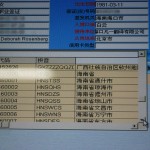
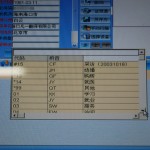
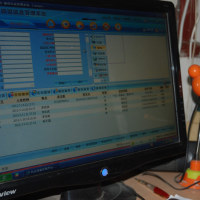
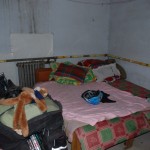


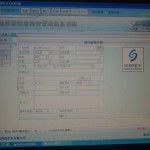







Shijiazhuang was and still is a weird place. I’ve been going there consistently since 2004 and they’ve always made up their own rules when it came to foreigners.
Sure, all the hotels can technically take them but the PSB requires of the hotel manager in person to take a photocopy of the passport down to the station, a stupidity that most hotel managers find annoying and not worth the hassle, especially in smaller hotel chains like hanting express. This was still happening last year!
As far as I know, they haven’t changed much with this…
Nice article – thanks for teaching me new Chinese 🙂 I’ll just bring you along whenever I need to check into a cheap hotel though, ok? Wait…that sounded wrong…
Pingback: Today's China Readings June 22, 2012 | Sinocism
I have a whole bunch of Guangxi photos to add to the gallery when I have stable internet again.
As for the Shijiazhuang police requiring a hotel employee to take a photocopy of the passport to the station, that was Standard Operating Procedure (in the event that you registered at all) in the days prior to the computer system.
That it has morphed into “hotel manager” surprises me not at all. I also wouldn’t be surprised if none of the hotel managers of the star hotels in Shijiazhuang that regularly take foreigners does it.
From my recent experience of making life unpleasant for obstructionist police officers who made up their own rules in Guizhou, there is nothing quite like going to the station and demanding badge numbers.
The idea behind this tutorial is both to help people understand the rules and to let them know how to register themselves when hotel staff is clueless.
Hopefully people who read this tutorial will be able to get behind the counter and into the computer without having to go to the police. But if its one of those cities where restrictions apparently exist because the police superintendent’s brother owns a hotel, then I hope that more foreigners go to the trouble of making things uncomfortable for the cops.
Pingback: Hao Hao Report
Never ever had a single problem in China, and I always stayed in cheap motels / Hanting / 7Days. And I’m clearly a foreigner. Probably speaking chinese helps.
Speaking Chinese has nothing to do with it. You should know better than to say ‘never’ in China. What everyone is saying here about Shijiazhuang (SJZ) is true. It’s cyclical though. Harder on weekends and holidays. One secret I found was that the Victoria(?) Hotel by the train station will book foreigners into a Suite when Rooms are unavailable.
Several times I’ve arrived in SJZ at 4am, with reservations, and been denied all over town–denied in Chinese.
But again, someone at the Victoria usually declares that suites aren’t rooms and are therefore okay. Luckily, the suite’s rate has been around RMB 450. Not like having to check into a suite at the Hilton.
Foreigners staying for weeks at a time are asked to check out during these black-out periods. I recommend a trip back to Beijing.
In the last 91 days that I’ve been on the road, I’ve had over a dozen hotels outright reject me and specifically state that it was because I was a foreigner and “they didn’t have a license for foreigners”. There were also a few suspicious incidents of “no rooms available”.
I was also rejected at an airport hotel in Shanghai last winter and, while staying at a youth hostel in Shanghai met a Chinese born foreign passport holding businesswoman who was staying at the hostel because the place she had reservations turned her away owing to “not having a license to accept foreigners”.
Most of the times I’ve been rejected, the hotel next door is fine with taking my business. Sometimes, I’ve ended up needing to talk to the police before I get my hotel room.
Obviously, you’ve been lucky with regards to places accepting you but its not just me, and not just other cyclists on Crazyguyonabike reporting being rejected. It’s lots of people in all kinds of situations including businesspeople trying to stay at medium nice places. And its wrong. Maybe not as wrong as other situations where grassroots authorities ignore national law, bt unlike OCP it specifically affects me.
We cycled China from Yunnan over to Fuzhou. We were rejected tons of times. The very first night rejected from a 3 star hotel. We rocked up after 10 hours on the bike, lost, night, hammering rain. We couldn’t speak Mandarin, nor they English. They gave us hot tea, pointed at their stars many times, then showed us the door. Generally it was much easier to go find another place to stay then going over it. We always found somewhere ranging from hotels to truck stops.
Really good article tho!
Thank you so much for this tutorial, I’ll print this out and bring it with me the next time I head out on a trip. Good idea to point out to be polite, as frustrating as this situation can be, most hotel employees and owners aren’t rejecting you out of animosity, but out of sheer ignorance. No need to be rude, unless they’re being rude too, then go all guns blazing.
I was rejected all over Henan last week, had to turn back. It was that bad.
“hotel employees and owners aren’t rejecting you out of animosity, but out of sheer ignorance”
There is a word in English that describes refusing services based upon someone not being of ‘Native Nationality’.
It is not, nor never has been, a word lacking in animosity.
We need to call this what it is.
please please, its only now that i come across your explanations, can you please take a look at this http://malaysia.answers.yahoo.com/question/index;_ylt=AtfXJ9z79_Je._x5BtKz8gu4QAx.;_ylv=3?qid=20130511112917AAOXUTk
i’ll be staying at a 7-days inn [wuhan] and at green tree [nanjing]- will i get this license problem ? is it true that often times showers and air conditioning are not including ?and that they change the sheets only once a week ? am i protected from these kind of bad suprise at those kind of chain hotels ?
I don’t know why I just saw this comment from a year ago but I’m responding anyways.
Anything upwards of CNY 100 a night you can be pretty sure comes with hot water and air con and a private bathroom.
On 2014’s Adventure (21 days in) the only times I haven’t had air conditioning are when I have specifically asked to *not* have air con (I prefer a fan) and, even then, I’ve actually had difficulty finding places that have a fan room to offer me.
As for not changing the sheets, this is more of a problem with really rural places but getting to be less and less of an issue (I’m amazed at how *clean* the countryside hotels have gotten just since 2012). I did have a 5-star hotel in Haikou that I caught not changing the sheets between customers, however… 🙁
i’d like to add that the laws regarding [and missing] accommodation have been replaced entirely
further, situations like sjz and henan province come down to local laws that are not publicly promulgated. for example, changsha-city has laws barring foreigners but only in several 2.5km radius’s within kaifu and furong districts
it would be nice(r) if there were a more public collection of local laws, which would then allow translations into english
I don’t know why I just saw this comment from a year ago but I’m responding anyways.
Anything upwards of CNY 100 a night you can be pretty sure comes with hot water and air con and a private bathroom.
On 2014’s Adventure (21 days in) the only times I haven’t had air conditioning are when I have specifically asked to *not* have air con (I prefer a fan) and, even then, I’ve actually had difficulty finding places that have a fan room to offer me.
As for not changing the sheets, this is more of a problem with really rural places but getting to be less and less of an issue (I’m amazed at how *clean* the countryside hotels have gotten just since 2012). I did have a 5-star hotel in Haikou that I caught not changing the sheets between customers, however… 🙁
Not only not publicly promulgated in some central database but apparently not publicly promulgated or printed at all!
On no occasion where I have demanded that the local police either show me something _in writing_ that says “no foreigners allowed” or let me stay at the hotel of my choice have they ever been able to produce anything in writing. Ever.
(The third option is for me to accept that I’m not allowed to stay in their district but me to post their photos and badge numbers to Weibo along with a description of the situation.)
Pingback: Usage of HKID card in China - Page 2 - Hong Kong Forums - GeoExpat.Com
Most China hotels do not welcome tourists! We were travelling in China as foreigners nearly 60 days and our goal was to sleep in hotels. We drive during the day, as we like and search on the GPS a hotel with a good location. We asked in some cities at more then 10 hotels for available rooms, but we got treated like criminals. It’s frustrating! We payed all hotels, we never destroy something, we are clean – but they don’t want us!!! One night we already checked-in in a hotel, already slept, we had to leave the hotel at midnight, because they realized, they cannot take foreigners. But when we asked, we payed, we showed passport! So we realized that hotels in China has this old-fashion ugly rules, we started to sleep in the rental car. When there was hotel available for tourists, we stayed in hotels. But there are only a few. Most in the cities centre and we do not want to waist our time stay in the traffic jam to get a hotel which does welcome tourists. So we adjust the rental Van and had our good sleepy bag with us. Very easy and we could sleep at this nice spots at the lakes or nice landscapes, where plenty of good hotelrooms were available – but only for Chinese and not for tourists! A shame for China! And we saved a lot of money, we wanted to spend in China…. We recommend: travelling in China – avoid hotels – rent a car/van and sleep in the car.
Any update on this for g20? Basically many many hotels in shanghai and hangzhou on BOOKING right now list: mainland chinese id card, etc.
I know this is a really old post but feel like commenting anyway. Seems like it hasn’t changed much. I discovered that rejection is likely to happen in Beijing, Shanghai and the small cities around these areas. I haven’t had problems in other provinces when traveling. Anyway, want to know if you know more about this certificate now? Like is there a certificate, does it count all over the country but some hotels don’t care or is it just a local rule somewhere because they don’t want the hassle?
Thanks and cheers 🙂
Lena
I was studying at a private Chinese language school in Harbin, China. The night before I arrived in Harbin I stayed at a hotel in Qingdao.
The school inquired about getting my L tourist visa extended at the PSB and they informed the school that they would need a copy of the Temporary Residence Registration Form for Foreigners from the hotel I stayed at in China. Which from what I gather is just a print out of this form that hotels fill in on the computer when registering foreigners to stay.
Both the head teacher and the school principal phoned the hotel and the hotel was completely clueless. There was nothing that could be done.
Eventually I got an X2 visa managed by another Chinese language school in Harbin but I’m curious. What happened here? Why couldn’t the hotel print out a copy of my registration? Why were they completely clueless as to what it was despite the fact that the check-in staff would have filled it in on my arrival? What’s the best way of asking a hotel for a copy of this? What’s it called in Chinese?
Pingback: My Failed Tibet Trip: Permits, Solo Travel, Getting Stuck in Xining, and the Amdo Route from Xining To Chengdu - 4corners7seas